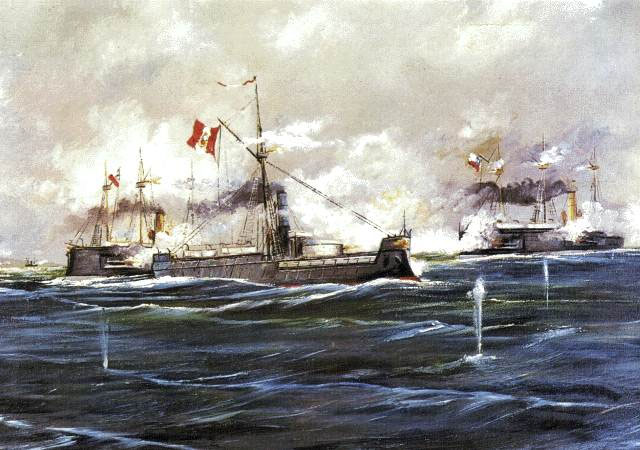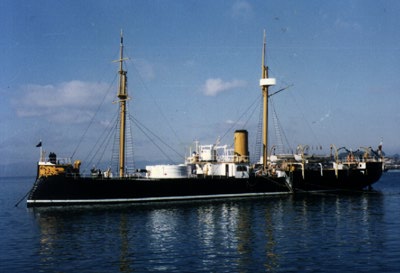Fullbore Friday

 Talk about retro. Let's go WAY BACK for the 1st of SEP. Monitors. South American Monitors. How cool is that? I offer you the Huascar of Chile (after being captured by Peru). This is a ship with a record.
Talk about retro. Let's go WAY BACK for the 1st of SEP. Monitors. South American Monitors. How cool is that? I offer you the Huascar of Chile (after being captured by Peru). This is a ship with a record.Huáscar participated in the Peruvian Civil War of 1877. Seized at port in Callao by rebels led by retired Captain Germán Astete, she was used to harass, sabotage and disrupt government forces and shipping lanes. During these actions foreign shipping was also affected, leading to British intervention.
On May 29, 1877, she fought the inconclusive Battle of Pacocha against two British vessels, frigate HMS Shah and corvette HMS Amethyst, commanded by Admiral de Horsey. This battle saw the first use in anger of the newly-invented self-propelled torpedo which, at the time, had just entered limited service with the Royal Navy.
...
Huáscar participated in the War of the Pacific, initially in the service of Peru. Once again under the command of Captain Miguel Grau, she became famous for daring harassment raids on Chilean ports and transports. As a result, during the opening months of the war, the ground invasion was delayed for almost six months until the Chilean fleet could find and stop Huáscar.
The Battle of Iquique
Enlarge
The Battle of Iquique
In May 21, 1879, Huáscar led the lifting of the Chilean blockade of Iquique. During the battle, Chilean Captain Arturo Prat was killed on Huáscar's deck while leading a boarding party from the corvette Esmeralda. Notably, after sinking the corvette by repeated ramming, Huáscar then rescued the survivors before continuing pursuit of a fleeing enemy ship.
Huáscar went on with its mission and in the following months accomplished the following:
* Damaged ports of Cobija, Tocopilla, Platillos and Mejillones, Huanillos, Punta de Lobo, Chañaral, Huasco, Caldera, Coquimbo and Taltal
* Sank 16 Chilean vessels, including ships and boats
* Damaged Chilean ships Blanco Encalada, Abtao, Magallanes and Matías Cousiño
* Captured Chilean vessels Emilia, Adelaida Rojas, E. Saucy Jack, Adriana Lucía, Rímac and Coquimbo
* Aboard Rímac, captured 260 men from an elite Chilean cavalry regiment, along with horses, weapons, munitions and supplies
* Recovered Peruvian vessels Clorinda and Caquetá
* Destroyed artillery batteries of Antofagasta
* Cut the Antofagasta-Valparaíso communications cable
Collectively, these actions became known as "Las correrías del Huáscar" ("Huáscar's exploits") and held up a Chilean ground invasion for almost six months. As a result, the Peruvian Navy promoted Captain Grau to Rear Admiral while the Chilean Navy replaced its own chief of staff.
On October 8, 1879, Huáscar was captured by the Chilean Navy at the Battle of Angamos, during which most of Huáscar's crew were killed, including Rear Admiral Grau.
Huáscar then entered the service of the Chilean Navy. At Arica she fought an inconclusive duel with the Peruvian monitor Manco Cápac (formerly USS Oneota) while participating in the bombardment of the city –where her new commander Manuel Thomson was killed– and she also aided in the blockade of Callao.
Best of all, she is still afloat. Give her a visit next time you are in Chile. She is the last of her kind.


 Talk about retro. Let's go WAY BACK for the 1st of SEP. Monitors. South American Monitors. How cool is that? I offer you the Huascar of Chile (after being captured by Peru). This is a ship with a record.
Talk about retro. Let's go WAY BACK for the 1st of SEP. Monitors. South American Monitors. How cool is that? I offer you the Huascar of Chile (after being captured by Peru). This is a ship with a record.
No comments:
Post a Comment